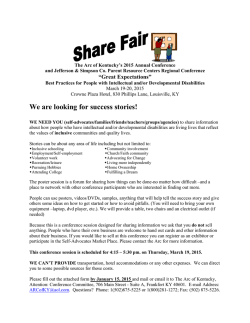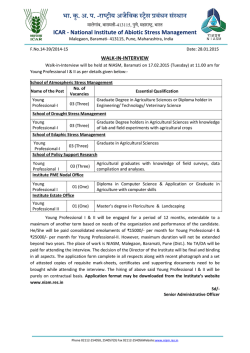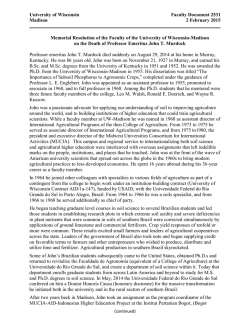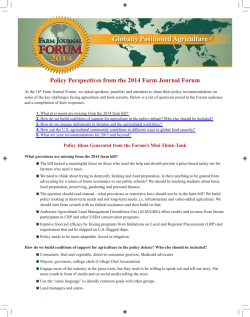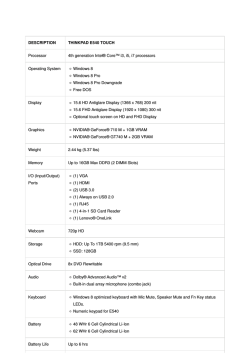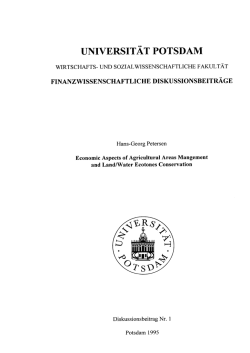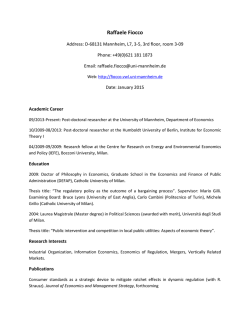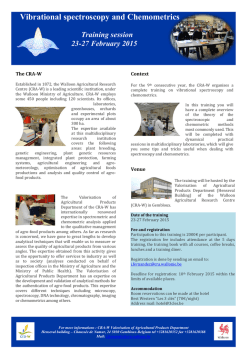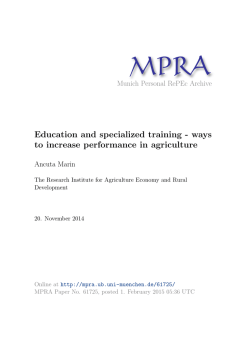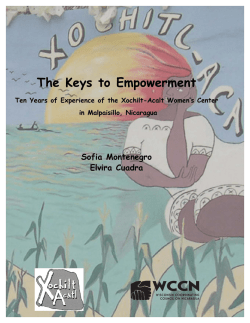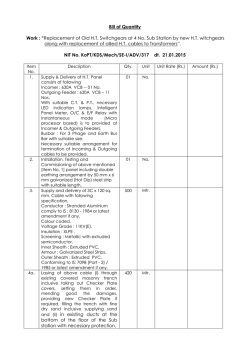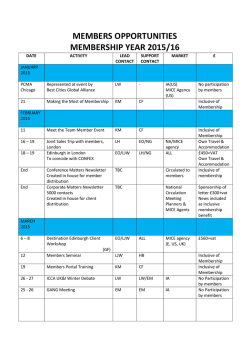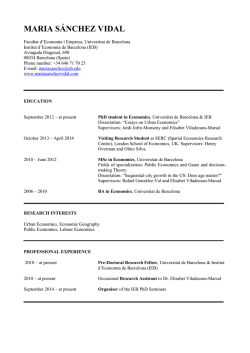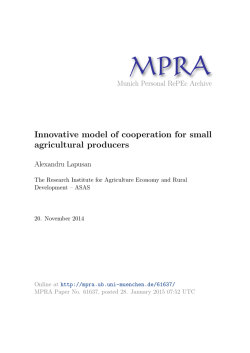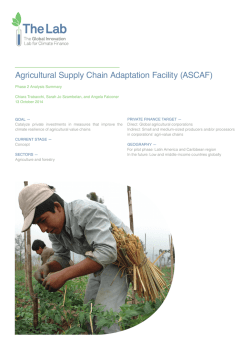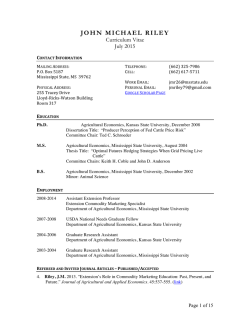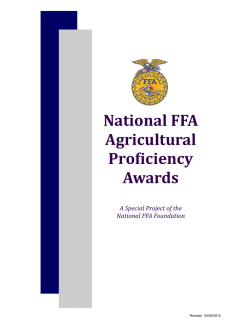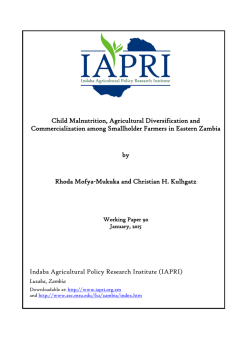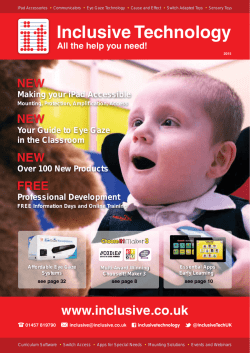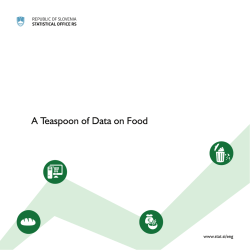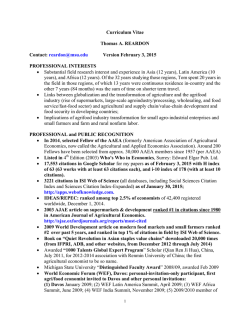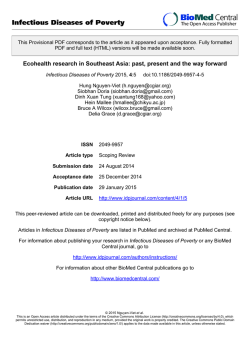
Gender Equality Mainstreaming Digest
GEM Digest of the Month for February 1, 2015 176 Gloucester Street, Suite 320, Ottawa, Ontario K2P 0A6, www.aic.ca The Gender Equality Mainstreaming (GEM) Working Group of the Agricultural Institute of Canada (AIC) gathers information and articles on an ongoing basis on gender equality mainstreaming within agriculture, scientific research, rural development, climate change, organizational development and international development. Information is shared with members, partners, scientific societies and member organizations. The views and opinions presented are not necessarily representative of AIC. If you have information to share, please send it to [email protected] to compile and re-distribute once a month. Back issues of the GEM Digest are available at http://www.aic.ca/gender/resources.cfm. Meeting of Muwaviwa Women’s Network Association members at Ukiriguru, Tanzania in January 2015. Photo courtesy of D. Ceplis. Dinah Ceplis, P.Ag. (Ret.), FGhIH, FAIC GEM Committee Member (Volunteer) ++++++++++++++++++++++++++++++++++++++++++++++++++++++++++++++++++++++++++++++++++++++++++++++++++ Opportunities and Upcoming Events 1. ICARDA recruiting postdoctoral fellow on gender................................................................................................................ 2 2. Job opportunity: Deputy Director, Gender Responsive Agriculture ..................................................................................... 2 3. Program Advisor: Gender and Youth Development Officer ................................................................................................. 3 4. Call for proposals from IDRC: Growth and Economic Opportunities for Women ................................................................ 3 5. International Home Economics Conference ......................................................................................................................... 3 6. World Home Economics Day – March 21 ............................................................................................................................. 4 7. MCWESTT (Manitoba Community for Women in Engineering, Science, Trades and Technology) 2015 Conference ......... 4 8. Market Systems Development - Webinar and Online Discussion Series.............................................................................. 4 9. Call for Papers from Canadian Woman Studies/les cahiers de la femme ............................................................................ 5 This Month’s News 1. New ADM at DFATD’s Partnerships for Development Innovation Branch ........................................................................... 5 1 2. Six Pieces of the Innovation Puzzle: Part 6 – Empowering Women ..................................................................................... 5 3. Anemia in Eastern Cuba Reflects Inequality ......................................................................................................................... 6 4. Africa’s Rural Women Must Count in Water Management.................................................................................................. 6 Reports, Publications and Resources 1. Women’s Economic Empowerment: Pushing the Frontiers of Inclusive Market Development .......................................... 6 2. Resources available from the second Gender-Nutrition Methods Workshop ..................................................................... 7 3. How to Build Cleaner Burning Stoves ................................................................................................................................... 7 4. Life stories of African women and young professionals in science ...................................................................................... 8 5. Girls and Women in STEM in Asia – UNESCO Report ........................................................................................................... 8 6. Gender, youth and urban labour market participation ........................................................................................................ 8 7. Gender-Equitable Public Investment: How Time-Use Surveys Can Help ............................................................................. 9 Go to top. +++++++++++++++++++++++++++++++++++++++++++++++++++++++++++++++++++++++++++++++++++++++++++ Opportunities and Upcoming Events 1. ICARDA recruiting postdoctoral fellow on gender http://www.icarda.org/ https://genderfoodpolicy.files.wordpress.com/2015/01/crp-ds-pdf-gender-icarda-ad.doc The International Center for Agricultural Research in the Dry Areas (ICARDA) is seeking a postdoctoral fellow to determine the roles of masculinity and femininity in the design and implementation of water and agricultural innovations in Egypt, in order to remove gender inequalities and empower women through innovation processes. More broadly, the postdoctoral fellow will contribute to the CGIAR Gender Network’s research, particularly to the Global Study on Gender Norms and Agency in Agricultural Innovation, and to the Gender and Empowerment Intermediate Development Outcome (IDO). The position is based in Cairo, Egypt. Applications are being accepted until February 12, 2015. Go to top. +++++++++++++++++++++++++++++++++++++++++++++++++++++++++++++++++++++++++++++++++++++++++++ 2. Job opportunity: Deputy Director, Gender Responsive Agriculture http://oxfordhr.co.uk/job/deputy-director-gender-responsive-agriculture/ African Women in Agricultural Research and Development (AWARD) is accelerating agricultural gains across Sub-Saharan Africa by investing in the scientific and leadership skills of Africa’s leading women agricultural scientists. This position will work closely with the Director on major initiatives that raise AWARD’s regional and global profile as a leader in the Gender Responsive Agriculture Agenda. The incumbent will oversee AWARD’s Monitoring, Learning & Evaluation, Communications, and Data Analysis units, ensuring that they support the program (both internally and externally) in building an expertly informed focus on gender responsive agriculture for Africa. The ideal candidate will be a compelling leader, able to 2 translate data on gender and agriculture into compelling narratives and action points, and share these in a variety of formats with key players in global agriculture arena. Go to top. +++++++++++++++++++++++++++++++++++++++++++++++++++++++++++++++++++++++++++++++++++++++++++ 3. Program Advisor: Gender and Youth Development Officer https://www.usajobs.gov/GetJob/ViewDetails/392495800 The Office of Food for Peace is recruiting a Program Advisor (Gender and Youth Development Officer). The individual will serve as a USAID/ Bureau for Democracy, Conflict and Humanitarian Assistance technical adviser on gender and youth related issues in agricultural development and food security. The individual will lead the development of a strategic agenda for ensuring that gender gaps and gender relations are addressed in Food for Peace’s emergency and development programming in agriculture, nutrition, and livelihoods, helping to ensure that they equally benefit women, men, and youth; and will provide other assistance to promote increased incomes and food security as well as enhanced leadership roles for women. US Citizenship is required for this position. Closing date is February 17, 2015. Go to top. +++++++++++++++++++++++++++++++++++++++++++++++++++++++++++++++++++++++++++++++++++++++++++ 4. Call for proposals from IDRC: Growth and Economic Opportunities for Women http://www.idrc.ca/EN/Funding/Competitions/Pages/CompetitionDetails.aspx?CompetitionID=87 The Growth and Economic Opportunities for Women (GrOW) program has announced a new call for research proposals. This call, on the effects of patterns of growth on women’s economic empowerment aims to generate new evidence on the impact of specific growth patterns, and which public policies and interventions can ensure that the positive effects of growth on women’s empowerment are enhanced. Please have a look at the call, at IDRC’s competitions page. The closing date for applications must is 17:00 (GMT)/12:00 (EST) on February 23, 2015 and applications are through the IDRC online application process. The GrOW program is a joint initiative of DFID UK, The Hewlett Foundation, and IDRC. Budget total and apportionment: Through this call a single consortium is expected to undertake six to eight (6-8) projects within a total budget of up to CA$2 million. There is scope for funding one to two (1-2) individual research projects of under CA$300,000 if the proposed research is on a priority area. Go to top. +++++++++++++++++++++++++++++++++++++++++++++++++++++++++++++++++++++++++++++++++++++++++++ 5. International Home Economics Conference http://www.um.edu.mt/events/ifhe2015 The International Federation for Home Economics (IFHE) Annual Leadership Meeting 2015 and the International Home Economics Conference are being held 19th - 21st March 2015 in the city of Valetta, Malta. The International Conference has been organised in cooperation with the University of Malta and the European Association for Home Economics. The theme of “Action for Family and Consumer Wellbeing: Home Economics Literacy Bringing Skills to Life” will see international experts present their research and best practice. A focus of the IFHE Annual Leadership Meeting 3 2015 will be on the activities of the different IFHE Programme Committees and IFHE Council Committees in preparation for the IFHE World Congress 2016. Go to top. +++++++++++++++++++++++++++++++++++++++++++++++++++++++++++++++++++++++++++++++++++++++++++ 6. World Home Economics Day – March 21 http://www.ifhe.org/1119.html 21st March 2015 is Celebrating World Home Economics Day. The campaign title is Sharing food: Healthy and sustainable choices. Go to top. +++++++++++++++++++++++++++++++++++++++++++++++++++++++++++++++++++++++++++++++++++++++++++ 7. MCWESTT (Manitoba Community for Women in Engineering, Science, Trades and Technology) 2015 Conference http://www.apegm.mb.ca/MCWESTT/ The 2015 MCWESTT (Manitoba Community for Women in Engineering, Science, Trades and Technology) conference, a full day of professional development options, will be held at the Fort Garry Hotel in downtown Winnipeg, Manitoba, Canada on May 8, 2015. Early bird registration opened Dec. 1, 2014. Go to top. +++++++++++++++++++++++++++++++++++++++++++++++++++++++++++++++++++++++++++++++++++++++++++ 8. Market Systems Development - Webinar and Online Discussion Series http://www.empowerwomen.org/events/market-systems-development This learning series will take place over the first half of 2015, bringing you the chance to closely engage with key experts on conceptual and practical issues around women’s economic empowerment in inclusive market systems. Through a thoughtprovoking sequence of webinars, e-discussions and social media engagement, participants will learn about good practices, practical implementation considerations and lessons learned. The discussion will consist of four distinct threads: 1. The theory behind the approach: Women’s economic empowerment in inclusive market systems development. 2. Practical implications part I: Inclusive business and women in market systems development 3. Practical implications part II: Labor markets and women in market systems development 4. Measurement methods: Women’s economic empowerment in market systems development Don’t miss out on these exciting opportunities to learn about women’s economic empowerment in market systems development! The series will be launched on January 29th, 9:30am-11:00am (EST), with a compelling webinar that explores conceptual theories and recently developed frameworks for women’s economic empowerment in inclusive market systems. You may want to read USAID's paper Women's Economic Empowerment: Pushing the Frontiers of Inclusive Market Development for background information. In this first webinar, the authors will briefly present the paper, and an expert commentator from the International Labour Organization will discuss potential implications. Ample time will be left for questions. 4 Immediately after the webinar, the e-discussion on women’s economic empowerment in inclusive market systems development will kick off. Experts from the webinars will be available to answer your questions and provide further inputs. Go to top. +++++++++++++++++++++++++++++++++++++++++++++++++++++++++++++++++++++++++++++++++++++++++++ 9. Call for Papers from Canadian Woman Studies/les cahiers de la femme http://www.inanna.ca/cwscf/calls.html Women's Human Rights Vol. 31, Nos. 2/3 (Fall/Winter 2015) This special double issue of Canadian Woman Studies’ (CWS/cf) will focus on feminist women’s human rights theory and activism as a visionary framework for movement-building and social change, activism and education, considering both the historical trajectory of this movement, current efforts, challenges and debates, as well as possibilities for the future in troubled times. Suggestions for topics include: Rural women’s human rights Land and water and WHR Health, environment and WHR WHR & food Sovereignty GMOs and WHR “Development” and WHR Your ideas for additional topics are welcome. Invited are essays, research reports, true stories, alternative forms of narration, poetry, drawings, and other art works that illuminate these issues. DEADLINE: JULY 15, 2015. Go to top. +++++++++++++++++++++++++++++++++++++++++++++++++++++++++++++++++++++++++++++++++++++++++++ This Month’s News 1. New ADM at DFATD’s Partnerships for Development Innovation Branch http://www.international.gc.ca/genev/mission/elissa_golberg.aspx?lang=eng Paul Samson announced that he is leaving his position as Assistant Deputy Minister of Partnerships for Development Innovation at the Department of Foreign Affairs, Trade and Development Canada. His successor will be Elissa Golberg as of February 2, 2015. Go to top. +++++++++++++++++++++++++++++++++++++++++++++++++++++++++++++++++++++++++++++++++++++++++++ 2. Six Pieces of the Innovation Puzzle: Part 6 – Empowering Women http://www.ifdc.org/media_center/ifdc-perspectives/december-2014/six-pieces-of-the-innovation-puzzle-part-6-empower 5 Gender equality is the final segment in the International Fertilizer Development Center (IFDC) blog series Six Pieces of the Innovation Puzzle. Women comprise almost half of the agricultural labor force in developing countries but lack equitable access to land, technology and markets. Empowered with the same opportunities as men, female farmers could grow 20-30 percent more food. Closing this gender gap would reduce the number of hungry people by up to 17 percent, making rural women the driving force for a food-secure world. Go to top. +++++++++++++++++++++++++++++++++++++++++++++++++++++++++++++++++++++++++++++++++++++++++++ 3. Anemia in Eastern Cuba Reflects Inequality http://www.ipsnews.net/2015/01/anemia-in-eastern-cuba-reflects-inequality/ BAYAMO, Cuba, Jan 14 2015 (IPS) - Cuba has met the United Nations goal of reducing hunger. But anemia caused by malnutrition is still a problem among infants, small children and pregnant women in this Caribbean island nation, which has been in the grip of an economic crisis for over two decades. In Cuba, which has met the U.N. Millennium Development Goal (MDG) of halving the number of people who live in hunger, from 1990 levels, less than five percent of the population of 11.2 million is undernourished. Although anemia is still a health problem, the situation has improved in recent years. See the link for the full article. Go to top. +++++++++++++++++++++++++++++++++++++++++++++++++++++++++++++++++++++++++++++++++++++++++++ 4. Africa’s Rural Women Must Count in Water Management http://www.ipsnews.net/2015/01/africas-rural-women-must-count-in-water-management/ NAIROBI, Jan 26 2015 (IPS) - More women’s voices are being heard at international platforms to address the post-2015 water agenda, as witnessed at the recently concluded international U.N International Water Conference held from Jan. 15 to 17 in Zaragoza, Spain. But experts say that the same cannot be said of water management at the local level and countries like Kenya are already suffering from the impact of poor water management as a result of the exclusion of rural women. See the link for the full article. Go to top. +++++++++++++++++++++++++++++++++++++++++++++++++++++++++++++++++++++++++++++++++++++++++++ Reports, Publications and Resources 1. Women’s Economic Empowerment: Pushing the Frontiers of Inclusive Market Development http://www.empowerwomen.org/~/documents/2014/12/18/22/48/womens-economic-empowerment-pushing-thefrontiers-of-inclusive-market-development The Leveraging Economic Opportunities (LEO) project aims to improve USAID programs, projects, and activities focused on creating inclusive market systems. To support this process, LEO has developed a framework that defines market systems 6 and offers general guidelines for interventions. The framework presented in this paper identifies gender considerations and provides examples for facilitating women’s economic empowerment in inclusive market systems. Go to top. +++++++++++++++++++++++++++++++++++++++++++++++++++++++++++++++++++++++++++++++++++++++++++ 2. Resources available from the second Gender-Nutrition Methods Workshop https://genderfoodpolicy.wordpress.com/2015/01/07/resources-available-from-the-second-gender-nutrition-methodsworkshop/#more-2812 On December 2-4, 2014, the CGIAR Research Program on Agriculture for Nutrition and Health (A4NH) held the second annual Gender and Nutrition Methods Workshop, hosted by Bioversity International in Rome. Following the successful first A4NH gender-nutrition workshop held in 2013 in Nairobi, this year convened over 40 researchers and practitioners representing 9 CGIAR Research Programs and their partners to learn about and discuss how gender affects the pathways through which agriculture influences nutrition, with a thematic focus on women’s participation in decision-making. Resources from the workshop proceedings are now available: Workshop summary report, which covers the main topics of discussion and provides information on participants and their research Workshop overview and agenda, which includes abstracts of each presentation Presentations, all available on Slideshare Synthesis of existing resources on gender, nutrition and agriculture, created through a brainstorm by workshop participants Go to top. +++++++++++++++++++++++++++++++++++++++++++++++++++++++++++++++++++++++++++++++++++++++++++ 3. How to Build Cleaner Burning Stoves https://www.youtube.com/watch?v=Fvk6whI97zQ&feature=youtu.be For the last two years Aprovecho has been funded by the US Department of Energy to research and develop 'Tier 4' stoves. Three surveys were conducted of available cleaner burning stoves to determine techniques that resulted in Tier 4 scores on the IWA measures. The most effective techniques were then analyzed and improved using the iterative modeling and development method. A book detailing the results is being prepared that will include CAD drawings of five stoves that achieved Tier 4 on many of the nine metrics. The book will be published before October, 2015. The video introduces the design principles that resulted in cleaner burning stoves when measured by the WBT 4.2.2. The five stoves are now being field tested in six countries using the CCT. The goal is to learn how cleaner burning stoves that please cooks can be sold at market prices. The most market viable stoves will be manufactured by Shengzhou Stove Manufacturer in China. At the same time, all of the information will be available to anyone interested and will be opensource. Go to top. +++++++++++++++++++++++++++++++++++++++++++++++++++++++++++++++++++++++++++++++++++++++++++ 7 4. Life stories of African women and young professionals in science http://www.ypard.net/resources/life-stories-african-women-and-young-professionals-science This booklet takes a look at the life stories of 12 remarkable African agricultural scientists who are making a difference on the continent and internationally. Ten of them are the women and young researchers who were winners of the 3rd Africa wide science competitions. They are motivated to be part of the solution, and not the problem. Indeed, as researchers they are helping to transform agriculture by developing science-based solutions to some of the complex issues facing African farmers. Their journeys to becoming agricultural scientists are strikingly similar: most of them come from smallholder farms, and their flair for science was spotted and nurtured by their secondary school teachers. Go to top. +++++++++++++++++++++++++++++++++++++++++++++++++++++++++++++++++++++++++++++++++++++++++++ 5. Girls and Women in STEM in Asia – UNESCO Report http://unesdoc.unesco.org/images/0023/002315/231519e.pdf When we look into the fields of Science, Technology, Engineering and Mathematics (STEM), we must increase our capacities to cope with persisting challenges in growing threat of climate change, global health epidemics, migration, mounting poverty and increased income inequality, and for that we need to increase women’s participation in STEM fields. Through analysis of female participation in these fields, learning achievement and educational, psychosocial and economic influences, it answers three important questions with regard to girls and women in STEM: Where do we stand? What led us here? Where to from here? This report, which focuses on seven country studies in Cambodia, Indonesia, Malaysia, Mongolia, Nepal, the Republic of Korea and Viet Nam, is a significant report for us here in Asia, one which provides the foundation for further study and policy formulation in this region and beyond. Ultimately, the report tells us that early and targeted intervention through education can greatly facilitate girls’ and women’s increased participation in STEM fields. Go to top. +++++++++++++++++++++++++++++++++++++++++++++++++++++++++++++++++++++++++++++++++++++++++++ 6. Gender, youth and urban labour market participation http://www.securelivelihoods.org/publications_details.aspx?resourceid=346 Full summary: The creation of good jobs and decent work in conflict-affected places is widely seen to generate not just wealthier economies, but also safer societies and more legitimate states. However, a lot of policy thinking about job creation is dominated by technical approaches more concerned with balancing out supply and demand than with serious analysis of the role of institutions, identity and power in mediating access to opportunities. Drawing on qualitative data from 43 interviews and four focus group discussions, this study seeks to generate evidence on how urban labour markets actually work through an investigation of young people’s participation in the catering sector of Lira – a large and expanding town in post-conflict northern Uganda. It finds that, in general, Lira’s urban labour market is a long way off meeting the needs of the town’s youth: work tends to be poorly paid, stressful and insecure, characterised by high levels of horizontal mobility (workers move on quickly from one place to the next, and are often unable to build a career in a constant and identifiable profession) and low levels of upward mobility (opportunities for progression and accumulation are limited). What’s more, participation in the lower tiers of the catering sector exposes young women to different yet overlapping forms of gender-based vulnerability and violence. 8 Among the study’s main findings are issues of trade-offs (taking up one opportunity in the present may undermine someone’s ability to secure better opportunities in the future), social obligations vis-à-vis supporting family members in the village, and the links between participation in the labour market on bad terms and aspirations for self-employment. Go to top. +++++++++++++++++++++++++++++++++++++++++++++++++++++++++++++++++++++++++++++++++++++++++++ 7. Gender-Equitable Public Investment: How Time-Use Surveys Can Help http://www.eldis.org/go/latest-news/news&id=70345&type=Document#.VMpUtG90xMt Macroeconomic policy often fails to recognise the disproportionate burden of unpaid care work on women, and as a result reinforces both gender and income inequalities. By providing detailed information on how this burden is unequally distributed across gender, class, ethnicity and other socioeconomic characteristics, time-use data can help in guiding more equitable allocations of public resources and promoting government budget priorities that recognise the importance of unpaid work, both for the economy and for human wellbeing. For example: An analysis of the 2005 Tanzania TUS [time use survey] finds that 85 per cent of the individuals who spend more time on water collection than the national average daily minutes are women, and that over three-quarters of them live in rural areas. It also finds that a significant proportion of children (aged 5–14 years) are overburdened as well. Further investigation of the data reveals that those who are overburdened with water collection are also more likely to be food insecure, to be living in rudimentary household structures and to use firewood or dung as the main source of energy.... The Tanzania TUS could be further analysed to find out which of the ‘improved’ water supply sources is likely to enable the greatest time-saving and at the same time be most affordable for specific groups of women and men (e.g. rain water catchment tanks vs. protected public wells). Go to top. +++++++++++++++++++++++++++++++++++++++++++++++++++++++++++++++++++++++++++++++++++++++++++ 9
© Copyright 2026
